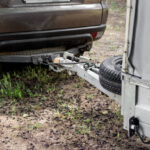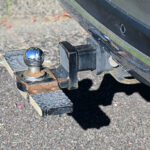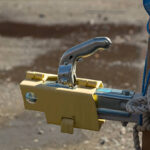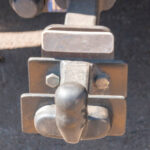How to Store a Hitch When Not in Use
One of those parts that are usually overlooked as far as towing safely and securely is concerned is the hitch pin. This How to Store a Hitch When Not in Use may appear too small to bother with, but you can come to an important decision between one types of hardware or the other when it comes to the matter of being in the driving seat of a towing unit? You may be towing a boat, camper, or utility trailer, and you should know how these types of hitch pins work, and the difference between these makes is essential to any driver.
In this article, the meaning and use, advantages, and disadvantages of how to store a hitch when not in use will be unpacked. Professional information that can also assist you in making a choice on which one to choose in terms of fitment, having regard to your towing specifications, will also be given to you.
What Makes the Hitch Pin Such a Big Deal in Tow Safety?
The hitch accessory or the ball mount is joined at the hitch receiver spot with a pin within the hitch. I mean it is the one that has your trailer hooked up to your car. It is a small yet significant part of towing safety. The effects vary greatly and may range as low as a lost trailer to as extreme as a complete road hazard on the highway with regard to how the hitch pin is fastened.
That is why it is not a secret that the knowledge of how to store a hitch when not in use is not only the technical clapper; it is the precaution that may allow you to save your cargo, your car, and all the people on the road.
The Hitch Pin Other Than a Locking Kind.
Security gear every set of hitches features some type of security device, the rudimentary model of which is the non-locking hitch pin. These pins are generally of steel or stainless steel and are inserted into receiver holes and ball mount holes and are easily clamped together with an ordinary clip or a cotter pin. They are particularly good at being easy and low budget.
They should open readily, require no key or combinations, and become available in a variety of sizes to suit a variety of towing situations. Otherwise, on contemplating how to store a hitch when not in use, we ought to note that, besides locking pins, we might well borrow the non-locking ones, which, admittedly, are also sort of usable, but almost entirely eliminate the risk of theft as well. This in itself would have been enough to attract that clip and shake the pin out, and this would have checked your trailer.
What is hitch pin locking?
The more modern kind of hitch pin is the locking hitch pin, which has some sort of locking mechanism built on the pin: a key or a combination. Not only are they produced to make sure that your trailer is not getting off, but they are also produced in a way that no one will ever take your trailer anywhere without your approval.
The lock capability simply means that a burglar will find it extremely challenging to remove your trailer as well as your car together or to detach an attachment mounted on a hitch, such as a bike rack or a cargo carrier. Considering one benefit, as it is an added security, the locking pin can give you peace of mind, which you can never quantify, as you leave your vehicle in a neighborhood that is not necessarily a street at all or vice versa when using streetcar parking.
Quality of construction and materials
The aspect that how to Store a Hitch When Not in Use diverges on scores is build quality. Lock pins are more frequently made of hard-wearing materials and can come with a weather-resistant coating or dust covers to enclose the lock cylinder. Those additional amenities are not typically implemented on non-locking pins that bear an adequate strength, still lacking some of these features, however. Towers and parkers who are frequently on the move or who permanently install their hitch gear may be another option because they may prefer to lock the pins of the ever-comprehensive collection of locks and accessories because quality metal might be the rationale.
Ease of Use: Which one can be considered to be more convenient?
Hitch pins that cannot be locked earn a couple of points on the simple side. These could be installed or uninstalled within minutes without keys or equipment. The hitch pins will take a bit more time to release and attach too but are not overcomplicated. You will have to memorize a key or code, and you might even have some sticky lock, as it might be affected by rain or snow and hence have to be guarded. Regarding the ease of use of How to Store a Hitch When Not in Use, you may choose an ease of use of your design upon this presumption of the number of lifts and subsequent removals of your trailer or accessory.
Security: The Vary in Purity
Security: We cannot afford to beat around the bush, but this is what enters the minds of people when they think of locking hitch pins. That is a tense scenario. When you park your trailer at a work site or a rest area or even at the back door of your home that has a back door and a non-locking spring pin, you are vulnerable. However, there is a locking pin that is a deterrent.
A foolproof lock does not exist, but most of the unplanned and opportunistic burglars will never desire to crack an excellent locking system. Any consideration at all that may be made on security of convenience may not be sufficient to creep a balancing weight towards ascertaining pins that may be locked in How to Store a Hitch When Not in Use the decision.
Comparison in Price Point
The second side of it is price. Most non-locking pins have prices lower than 15 dollars. Locking pins are between 25 dollars and 60 dollars or more, depending on the feature and the brand. During infrequent towing or towing location work, it may be necessary to use only a non-locking pin. Of course, it is a satisfactory waste when hauling expensive equipment or trailers over longer distances, but it can be worth doing in the long-term perspective. The price differential is merely one of the less sophisticated elements of the How to Store a Hitch When Not in Use debate and something that you ought to balance out to suit your own needs.
Optimal Applications of Locking Hitch Pins
Locking hitch pins are particularly important to anyone who tows high-value trailers or frequently parks their trailer in a location where the general population has access to it or is able to use accessories attached to a hitch, such as a bike rack. Another great modification that can be made to a locking pin is when your trailer has already been attacked. The locking hitch pin proves useful to many RV owners, off-roaders, and tradespeople: by storing their equipment safely in place, they can continue their journey or spend the night somewhere. Arm of How to Store a Hitch When Not in Use is not even much of an argument in such a scenario, but it has to be.
Cases of Non-Locking Hitch Pins Best
You would ideally need non-locking hitch pins: short-distance towing is not very common, so you will keep the pin in the backyard or watch the price. The only thing that makes it appear that non-locking pins are usually acceptable is when he is doing his own thing or takes local runs in utility trailers as part of his landscaper job. You can get the same without a lock with a non-locking solution, provided you are in a low-risk location and you do not mind flipping the pin when not in use.
The Afterlife and Lifespan Issues
Looking at How to Store a Hitch When Not in Use, the long term is a fact. Enhanced locking protection pins are also likely to have a longer life as they are weatherproofed. But they as well need certain routine maintenance, such as sky clapping the locking mechanism. Stamped, rigged Non-locking pins are more convenient to fit as well, although they stamp should there be exposure to rust, and then they are cheaper to renew. Perhaps a locking pin, better if it is highly noncorrosive, will serve you better in the long run so long as you happen to forget and would not readjust the pin each time.
Which of them shall we take? Final Thoughts
Whether you use How to Store a Hitch When Not in Use or not is merely a matter of whether you are towing anything with your towing system. When it comes to safeguarding against theft, thieves can be a menace, and therefore it is better that you trap thieves when you have valuable loads or trailers with you by making use of a locking hitch pin.
A case in point is where simplicity, celerity, and enormous coined cost are your chief mind, and where not so much peril to achieve in the same premises happens as in a background jail; a non-locking hitch pin may serve you to full barbarous refreshment. Whatever they may be, make sure that the product you buy will fit your type of hitch and the specifications of your vehicle.
Finally, the bright idea of towing is making the right decision.
Finally, knowing the major differences of how to store a hitch when not in use can help you to save some money and some time and anxiety. It does not sell hardware, but a piece of mind. The right hitch pin will not only keep your trailer and equipment safe and sound but will also imply no problems in regard to towing. Maybe you just want to do a couple of DIY jobs, or you are making a long cross-country move; an experience-driven and careful decision will enable you to be on the right path to success. It is never too late to be wise—and to be smart.
FAQs
How many of the trailer hitches use locking hitch pins?
Most of the locking hitch pins come in various lengths and an extremely broad range of diameters that fit into Class I to Class V hitches. Always make sure that your receiver size is correct and use the pin according to the style of your hitch.
Does a locking hitch pin have frozen or clogged potential due to low temperatures?
Oh yes, like any other lock, it is prone to frost and water. This can be apprehended by buying a capped lock that is weatherproof and later getting it lubricated after some time.



